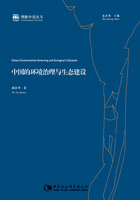
本书紧扣人类社会可持续发展的理论与实践困境.考察中国生态文明的建设实践,从环境、承载能力、工业化、城镇化、自然资源关联性、可再生能源革命,以及发展的“天花板”效应等方面,厘清了生态文明与工业文明的关联与区别,揭示了生态文明是相对于工业文明的一种社会文明形态,表明生态文明在中国的实践,改造和提升工业文明,有其必然性,具有普遍适用性,是人类社会经济发展的一个新的阶段,从而揭示生态文明发展范式的科学性和客观性。本书对中国生态文明的历史认知、成功实践与理论创新的分析与解读,在理论上具有开创性,从政治经济学的视角来揭示工业文明发展范式的局限性,构建生态文明的话语体系:在实践上,讲中国故事,展示中国生态文明建设的挑战、成就和风貌,反映了中国资源禀赋和发展需求的矛盾与和谐的必然性。本书指出中国的生态文明建设是对全球可持续发展思想和实践的积极贡献。
Closely focusing on the theory and practical dilemma of human society's sustainable development, this book explores China's practice of building ecological civilization. From the perspectives of environment, carrying capacity, industrialization, urbanization, relevance of natural resources, renewable energy revolution, the ceiling effect of development, etc., it clarifies the relevance and distinction between ecological civilization and industrial civilization,reveals that ecological civilization is a new social civilization formation compared to industrial civilization,and shows the inevitability and universal applicability of China’s practice of building ecological civilization to upgrade industrial civilization, thus demonstrating the scientificity and objectivity of ecological civilization development paradigm. Based on historical research, this book interprets the successful practice and theoretical innovation of China's ecological civilization. In theory, it ground-breakingly reveals the limits of industrial civilization's development paradigm from the perspective of political economy; in practice, through telling "Chinese stories", it demonstrates the challenges, achievements and features of building ecological civilization in China, reflecting the conflicts between China's resources endowment and its development demand and the inevitability of seeking harmony between them. This book also points out that China's building of ecological civilization positively contributes to global sustainable development,in theory and in practice.